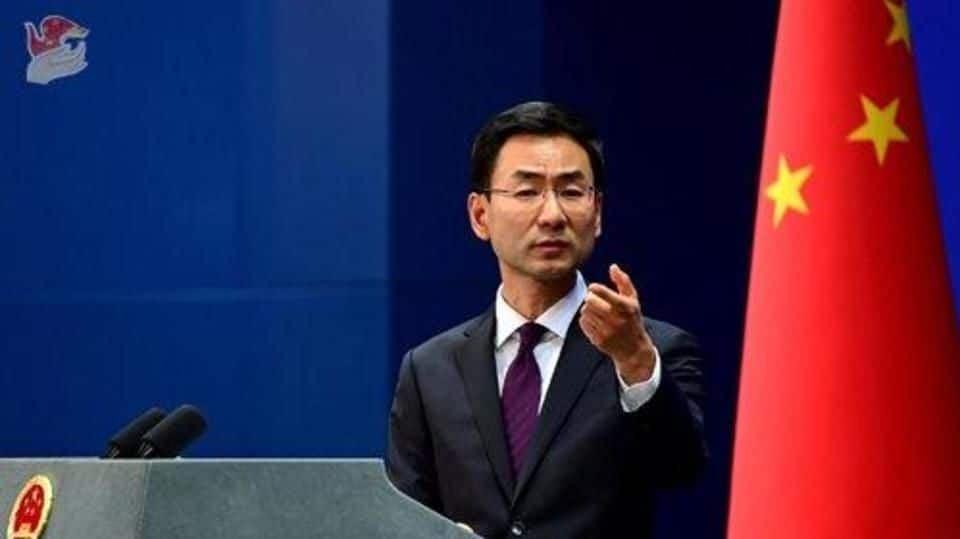
Maldivian crisis: China opposed to Indian intervention in Maldives
What's the story
After ex-Maldivian President Mohamed Nasheed urged India to intervene to end the ongoing political turmoil in the nation, China said it was against any external intervention to resolve the crisis. Chinese Foreign Ministry spokesperson Geng Shuang said they oppose foreign intervention, without directly mentioning India. Reiterating his demand, Nasheed, however, said Maldivians seek India's help as they see it as a "liberator". Here's more.
Details
Respect Maldives' sovereignty, says Chinese FM spokesman
Responding to Nasheed's request seeking Indian military intervention, China's Geng stated the international community should respect Maldives' sovereignty but not complicate the current situation, which is an internal affair, suggesting it doesn't need external intervention. On allegations that China is supporting Maldives' beleaguered President Abdulla Yameen, who approved Chinese projects, Geng stated, "China follows the principle of non-interference in the internal affairs of others."
Quote
Relevant parties in Maldives should find solution internally: Geng
Geng stated: "We hope relevant parties in the Maldives can...resolve the issue through consultations and restore national stability and social order as soon as possible. China maintains friendly cooperation with the Maldives, including the FTA which serves the common interests of the two countries."
Nasheed's request
Send envoy backed by military to Maldives: Nasheed to India
The former Maldivian President Nasheed, who is currently in self-exile in Sri Lanka, had earlier asked India to help the Maldivians. He requested India to send an "envoy backed by military" to Maldives in order to release two Supreme Court judges, former President Maumoon Abdul Gayoom, and other political detainees arrested on incumbent President Yameen's orders. He stated, "We request a physical presence."
Twitter Post
Maldivians see India's role positively: Nasheed
Saying ‘resolve things internally’ is akin to asking us to escalate the revolt, which can lead to chaos. Maldivians see India’s role positively: in ‘88 they came, resolved the crisis, and left. They were not occupiers but liberators. This is why Maldivians look to India now.
— Mohamed Nasheed (@MohamedNasheed) February 7, 2018
Origin
Crisis started with the ousting of democratically-elected President Nasheed
The entire political crisis started with the ousting of Maldives' first democratically-elected president, Mohamed Nasheed, in 2012. In the 2013 Maldives elections, contested between Abdulla Yameen and Mohamed Nasheed, the former took power. However, Nasheed's supporters claimed that the election was rigged. Later, in 2015, after several incomplete, erratic, and botched trials, Nasheed was sentenced to 13 years in prison on charges of terrorism.
Supreme Court order
Maldives Supreme Court orders release of wrongfully imprisoned opposition leaders
Fast forward to 2018. After years of meekness, the Supreme Court of Maldives, on 1st February, overturned convictions of terrorism and corruption against opposition leaders, including former President Nasheed, saying that their trials were "politically motivated". While President Yameen hasn't paid heed to the order and opposition demands to release the prisoners, the move legally allows former President Nasheed to contest this year's elections.
SC Order
Maldivian SC rolls back order to release detainees
Though the Maldivian Supreme Court ordered the release of opposition leaders, clearing Nasheed of terror charges, President Yameen refused to comply with the apex court's order triggering the ongoing turmoil. The President had even imposed a 15-day state of emergency in the country last week. However, three SC judges, loyal to Yameen, had annulled the order freeing the political detainees on 6 February.
Global Times
India should not interfere in Maldives' affairs: Chinese media
Meanwhile, China's state-run Global Times tabloid stated India should not interfere in the Maldives' political struggles. "New Delhi has no justification to intervene in Malé's affairs. The Maldives must be under huge pressure from India," it said. It further added India was infuriated when Yameen's government signed FTA with China, joined the Belt and Road Initiative, and "developed diplomatic ties with all major powers".